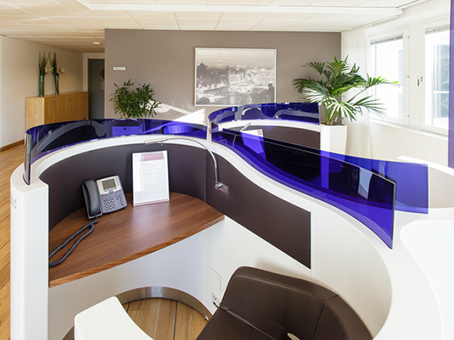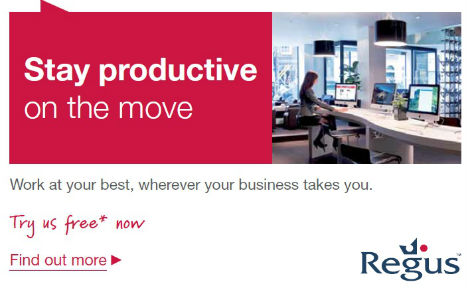Ten tips for succeeding as a start-up in Sweden
Swedish start-ups seem to be all the rage these days. As the country’s ranks of entrepreneurs continue to grow, The Local offers some tips for establishing a successful Swedish start-up from a company that’s been in the game for decades.

Sweden has a reputation for being the land of start-ups. Forget the Venice of the North, this is Europe’s Silicon Valley. And there’s a reason for that. Swedish culture is innovative and open, and starting a business – tech or otherwise – in Sweden is relatively simple.
But the unique Swedish market also presents its own challenges. And as an expat in the Swedish start-up world, things can get a little complicated.
Regus has decades of experience of working with start-ups, offering flexible, serviced office space in 100 countries across the globe, including, of course, Sweden, where operations continue to expand to keep up with the country’s ever-increasing ranks of entrepreneurs and small-business owners.
Click here to download a free pass to try out Regus workspace
And after years of catering to start-ups around the world, they have learned a thing or two.
The team at Regus are familiar with what start-ups and small businesses want and need - as well as what makes a new business successful. So we asked Regus for ten tips to help pave your way to Swedish start-up glory, whether you’re still in mulling your options or running a company looking to take things to the next level.
Here they are.
1. Have a dream
The first step, of course, is to have an idea. Some entrepreneurs spend days, weeks, months, or even years brainstorming and narrowing things down. That's one route - or you could focus on changing that thing that always frustrates you, whatever 'it' is. It doesn't necessarily have to be ground-breaking or new in every respect - you can also simply improve on something.
Swedes didn’t invent the seatbelt, for instance – they improved it by coming up with the three-point seat-belt now used in cars around the world.
Bounce your ideas off of trusted friends and family members, and go with the idea that makes sense and feels right.
2. Do your homework
Of course, even if your idea is good in theory, you've got to consider whether or not it will make any money. One key to making it through the start-up stage is to first research the market. Who are your competitors? Who are your target customers? How much will people be willing to pay for your solution, and is it worth it?
Look at Spotify for example. Several artists got onboard with low pay rates in the beginning to help it get off the ground, but now that the music streaming service is booming, they’d like better remuneration. These are things worth considering. Swedes like to do their research properly before making any life-changing decisions.
Click here to download a free pass to try out Regus workspace
Would people really have paid $20 a month for Spotify Premium? Would Candy Crush work as well today now that there are similar games on the market?
3. Take care of practicalities
Once you've got an idea and done the research, it's time to do business. There's a host of practical “stuff” to get out of the way. Make sure to register your company with the tax authority, Skatteverket - and pay those taxes.
Find out if you should register with Bolagsverket. Update your LinkedIn profile; because word has it Swedes love LinkedIn. Check with your bank if they have company services, and look at your insurance as well. If you have a really unique idea for a product, look into patents. Get this stuff out of the way now - these practicalities will save you time and money later. The website Verksamt.se, operated by several public agencies in Sweden, is a great ‘one-stop’ shop for a lot of these practicalities
4. Money, money, money
Yes, in order to establish your firm you frequently will need a certain amount of capital. As the Swedes sometimes say: it's important to 'have your stuff dry' (ha sitt på det torra), or sit on a secure economic foundation.
So how do you get it?
You can always ask friends and family for contributions, go to grassroots funding sources like FundedByMe or CrowdFunder, and check out incubators and investment agencies like Almi.
You might also want to look into loans and ask your bank if they have special programmes for small businesses, but make sure to check their interest rates and terms first.
Sweden also has a number of venture capital firms (Northzone and Creandum) and angel investors who might be able to give your business the boost it needs.
5. Find a space

A Regus working space in Solna, near Stockholm. Photo: Regus
Once you've got your idea, done your homework, and gotten all that other stuff out of the way, it's time for the real work to begin.
If you're going to run a business, you have to have somewhere to run it from. You can always try starting off from home, though it can be tough to get up the motivation while sitting in your kitchen. Not to mention the other pitfalls of trying to find the right work-life balance when your kids are playing beside your desk. Coffee shops can be noisy – not to mention expensive – and finding the right vibe to make you productive is no easy task.
Many newcomers on the start-up scene find that flexible office space is the best solution. Open-seating with like-minded career-oriented people creates a constructive and productive atmosphere to boost any company.
Click here to download a free pass to try out Regus workspace
Regus offers a variety of flexible options that cater to the different needs of any small business owner. Users can choose a private office or simply access to the company’s business lounges – complete with reception services, wifi, and even a company mailbox. Even better, Regus provides serviced offices in Stockholm, Gothenburg, and Malmö – allowing you to have an instant presence in Sweden’s main commercial hubs. Get a voucher to try Regus free here.
6. Find networks and mentors

Networking photo: Shutterstock
There’s a Swedish saying about gliding in on a shrimp sandwich (glida in på en räkmacka). Sounds rather gooey – but it basically means that contacts and circumstances can make life easy as pie.
It's just like making friends in school - but this time you're out to find contacts and mentors. Meeting and learning from other people who have started successful companies - or failed – can be invaluable. Have a fika and ask them for help.
And if you're using flexible office space in a community like Regus, your mentor (or next customer) may be just across the hall. Regus’ serviced offices in Stockholm often arrange mingles and meet-ups to help you make contact with the other users. Who knows, that conversation could be the start of a beautiful (and valuable) friendship.
7. Think global
Sweden is a booming marketplace - but it's also a tiny one. Thus many entrepreneurs in Sweden start companies that are “born global”, with aspirations of world-domination right from the start.
In readying your business to expand beyond Sweden’s borders, look for opportunities to expand the market, and make sure that your idea is feasible in other countries as well.
And international expansion doesn't have to be a massive, costly affair at first - it might just entail working abroad now and then or having an employee somewhere else. And who doesn't love to travel?
Using Regus, for example, gives you access to offices around the world, including Stockholm, Gothenburg, and Malmö. So whether it’s the UK, Germany, the US, or Brazil, Regus can provide you a an office there in an instant without the hassle of scouting a location or negotiating leases.
8. Be professional
They say you never get a second chance to make a first impression, and that rings especially true for small businesses. Investors and customers are buying into you, the founder, as much as the business because in the early days, you are the business
That being said, being professional in Sweden s less about how you dress and more about how you act as well as location, location, location. Feel free to go to work in jeans and sweater – but make sure you’re in the right place at the right time. And make sure that you have the resources to meet potential clients, customers, and investors. Regus serviced offices offer a professional vibe, a mature setting to show them you’re serious about business – and not an unkempt student at a coffeehouse hangout.
9. Be flexible and stay balanced

Meditation photo: Shutterstock
Starting a business will always involve certain risks, and things might not turn out the way you planned. You might get more funding than you expected, or not enough. You might find the perfect partner, or your life may take an unexpected turn. Your original idea might fizzle out but lead to something different – something even better. Be prepared to grow, but also be ready for growth pains.
But most critical to your Swedish start-up is the flexibility to stay balanced. No one (Swedish) likes a workaholic. Sweden is all about work-life balance, and if you “walk into the wall” (gå in I vägen, as they say, or get burned out), then the embers beneath your company will cool as well.
Flexibility and finding balance is easy with Regus, with city, national, and global options, as well as the choice of a permanent private space or lounge access, and there's always the option of upgrading for a few days of private office space each month. Several cities have multiple offices too - so if you're working in Stockholm, you can work one day from Östermalmstorg, and in Solna the next. It’s your call. Click here for a free pass to give it a try.
10. Drink coffee

Swedish coffee photo: Shutterstock
Finally, get that chin up. A sunny disposition and positive outlook will get you places. And more often than not– in a place as dark as Sweden – that means coffee. How do you think all those successful entrepreneurs and high-powered execs do it? Coffee, coffee, and more coffee.
Indeed, we’ve been told Swedes tout the second-highest coffee consumption per capita in the world. Luckily Regus has a number of options to help you satisfy your craving for coffee. Or tea, if that’s your thing. Of course, we can’t promise caffeine and start-up success are related, but it certainly can’t hurt.
Want to learn more about Regus and how they can help your Swedish start-up succeed? Click here or on the graphic below to download a free pass so you can see for yourself what Regus has to offer.
This article was produced by The Local and sponsored by Regus.
This content was paid for by an advertiser and produced by The Local's Creative Studio.








Join the conversation in our comments section below. Share your own views and experience and if you have a question or suggestion for our journalists then email us at [email protected].
Please keep comments civil, constructive and on topic – and make sure to read our terms of use before getting involved.
Please log in here to leave a comment.